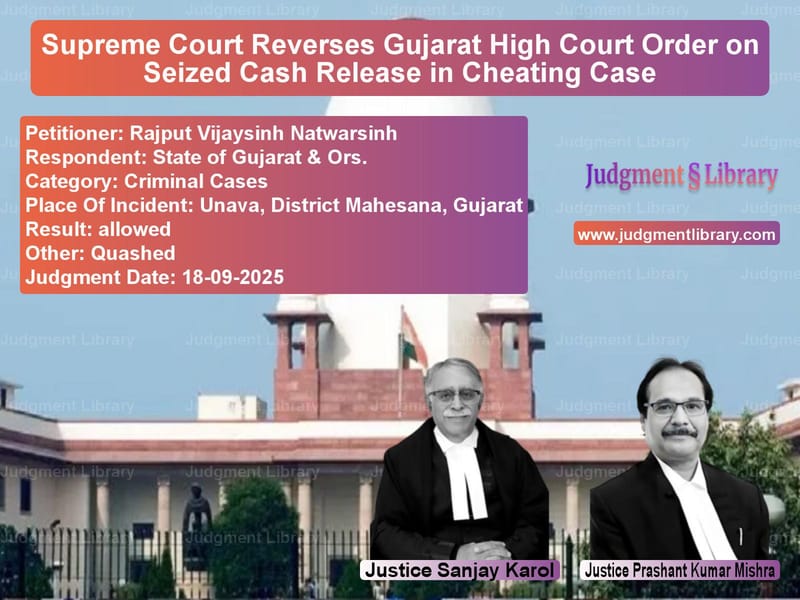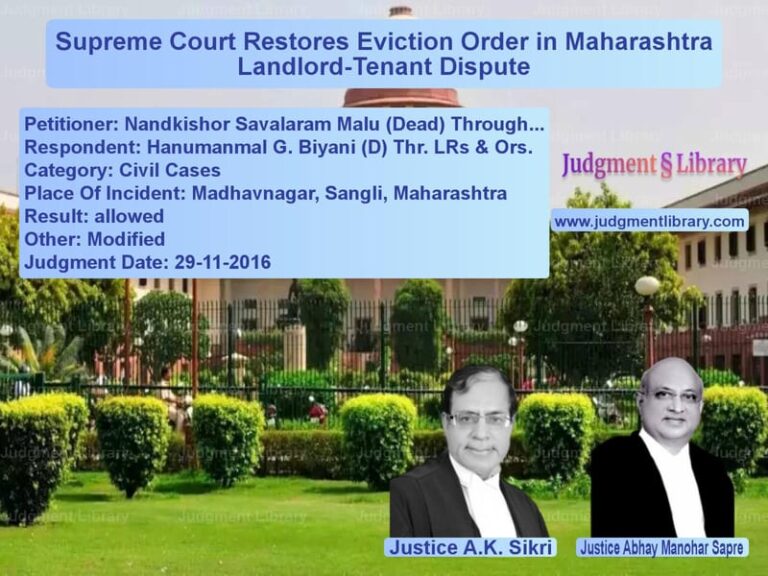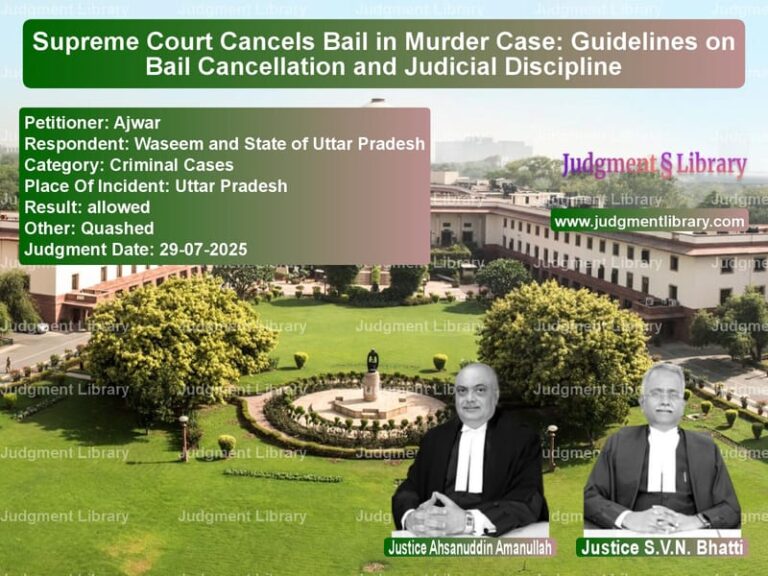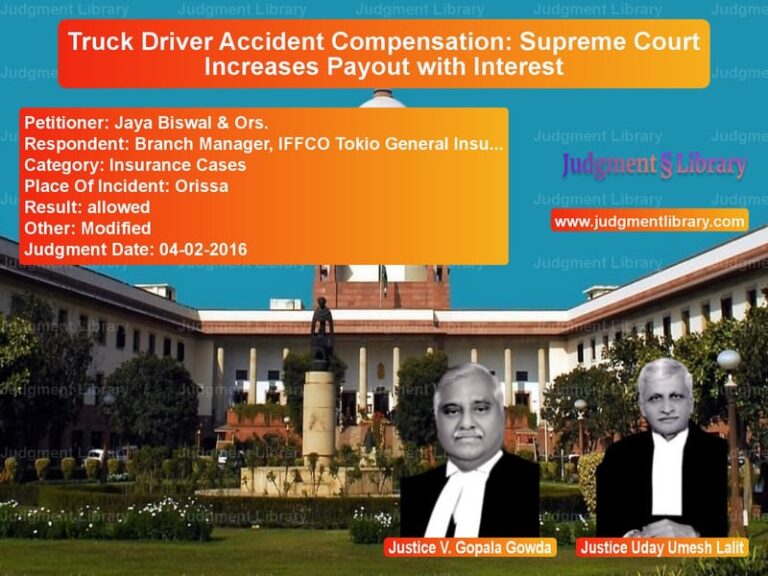Supreme Court Reverses Gujarat High Court Order on Seized Cash Release in Cheating Case
In a significant ruling that clarifies the legal principles governing the release of seized property during criminal trials, the Supreme Court of India recently delivered a judgment that has important implications for how courts handle disputed money in cheating and fraud cases. The legal battle centered around Rs. 50 lakhs seized during a criminal investigation and whether this money should be released to one claimant before the trial concluded.
The case began when Chiragkumar Dilipbhai Natwarlal Modi filed a complaint at Unava Police Station in Mehsana district, Gujarat, alleging that Rajput Vijaysinh Natwarsinh, the appellant, had conducted business with him worth Rs. 44,53,714 in castor seeds through his proprietary firm, Jay Gopal Trading Company. The complaint stated that cheques given by the appellant for this amount were returned due to insufficient funds. The investigation revealed that the company had similar outstanding payments totaling Rs. 3,49,07,073 to various other concerns, indicating a pattern of financial irregularities.
Following the investigation, the police filed a chargesheet on June 5, 2022, under Sections 406 (criminal breach of trust), 420 (cheating), and 120-B (criminal conspiracy) of the Indian Penal Code. During the investigation, authorities seized Rs. 50,00,000 in cash, which became the subject of the legal dispute.
Respondent No. 2, Bhargav Patel, filed an application before the Additional Chief Judicial Magistrate in Unjha seeking release of this seized cash. He claimed the money belonged to him for goods sold through his concern, Bhadrakali Tobacco, to the appellant’s company. To support his claim, he produced copies of bills, audit reports, and ledger accounts. However, the Trial Court refused his application, observing that “on perusing the charge-sheet, it appears at the present stage that in allegation against the accused of this case is that of committing cheating and breach of trust with the complainant and the witnesses stated in the charge-sheet and in that when objection of all the witnesses are not obtained on behalf of the applicant, then in that case, when the case proceedings are pending and it has become a matter of evidence as to whom the muddamal be handed over at this stage and hence, it does not appear to be proper and just to take any decision regarding muddamal.”
When the respondent appealed this decision to the Additional Sessions Judge in Mahesana, the higher court confirmed the Trial Court’s order, stating that “In this case, it has revealed during the investigation that the accused has committed cheating and breach of trust with so many merchants over and above the complainant. The investigating Officer has seized the above amount during the investigation as proceeds of crime money. Moreover, no any supporting evidence is produced on behalf of the applicant/accused by which it can be believed prima facie that the amount seized by the Investigating Agency is the amount prior to occurrence of the offence. Moreover, the list of victims is very lengthy as stated by the complainant in the complaint. It is the subject matter of evidence as to who lost how much amount from amongst the victims. In this way, this amount of relating to the proceeds of crime and hence, question of returning the said amount to the accused at this stage does not arise.”
Undeterred, the respondent approached the Gujarat High Court under Articles 226 and 227 of the Constitution. The High Court took a completely different view from the lower courts, allowing the petition and ordering the release of the cash to the respondent. The High Court reasoned that “Considering the facts and circumstances of the present case and procedure laid down by the Apex Court in case of Sundarbhai Desai (Supra), this Court is of considered opinion that, the interim custody of the cash amount, if released in favour of the petitioner, no prejudice is likely to be caused to the prosecution. Thus, therefore, the currency notes seized by the police is required to be released in favour of the petitioner who is lawfully entitled to claim the amount.” The High Court directed the authorities to release the cash on condition of furnishing a personal bond of equivalent amount and ordered that detailed panchnama of currency notes with their numbers and denominations be drawn for trial purposes.
Aggrieved by this order, the appellant approached the Supreme Court, leading to the current judgment. The Supreme Court carefully examined the legal framework, particularly Section 451 of the Code of Criminal Procedure, which deals with the custody and disposal of property pending trial. This section empowers criminal courts to make appropriate orders for the proper custody of property produced during any inquiry or trial.
The Court also considered its landmark judgment in Sunderbhai Ambalal Desai v. State of Gujarat, which had laid down important principles for handling valuable articles and currency notes during criminal proceedings. In that case, the Court had observed that “With regard to valuable articles, such as, golden or silver ornaments or articles studded with precious stones, it is submitted that it is of no use to keep such articles in police custody for years till the trial is over. In our view, this submission requires to be accepted. In such cases, the Magistrate should pass appropriate orders as contemplated under Section 451 CrPC at the earliest.” For currency notes, the Court had prescribed a similar procedure involving detailed panchnama, photographs, and proper security.
However, the Supreme Court in the present case found that while the High Court had correctly referred to the Sunderbhai Desai judgment, it had failed to properly apply it to the facts of the case. The Supreme Court made several crucial observations that form the core of its reasoning.
The Court noted that “The High Court has correctly referred to this judgment, however, in our considered view failed to appreciate its holding in the attending facts and circumstances of the instant case. We say so for the reason that the money in question was recovered as part of an investigation in which the exchange of money is the subject matter of controversy. As we have already noted supra, the dispute pertains to money paid to the complainant and other like firms, in the course of business. It is undisputed that respondent no. 2 has produced before the High Court certain documents to show that the proprietary firm through the appellant-accused, owed him/his concern a sum of Rs.50,00,000/-. However, it is entirely possible that the said sum of money was part of some other transaction. Simply because the amount owed to him matches the amount recovered does not establish that he is the only claimant to the said amount.”
This observation highlights a fundamental principle in criminal law – that when multiple claimants exist for seized property, particularly in cases involving alleged cheating of multiple victims, courts must be cautious about releasing property to any single claimant before establishing their exclusive entitlement through proper evidence during trial.
The Supreme Court further strengthened its position by stating that “As such, we hold that the Additional District and Sessions Judge, Mehsana correctly took the view that the direct ownership of the said Respondent cannot be conclusively established.” This endorsement of the lower courts’ reasoning underscores the importance of thorough examination of evidence before making determinations about property ownership in criminal cases.
The Court elaborated on the proper legal approach in such situations, observing that “The appropriate ownership of the sum of money can only be determined after consideration of all evidence and having taken into account the claims and views of all the other persons that the appellant-accused has allegedly played foul with, in business. The evidence presented by respondent no. 2 to establish his claim over the said amount will have to be considered by the Court seized of trial in the matter, and then only can a proper decision be arrived at. At this stage, therefore, releasing the muddamal would be unjustified and premature.”
This reasoning emphasizes that in cases involving multiple alleged victims of financial crimes, the trial court is the appropriate forum to determine the rightful ownership of seized money after considering all evidence and hearing all parties. Premature release to one claimant could prejudice the rights of other potential claimants and undermine the criminal justice process.
The Supreme Court’s decision to allow the appeal and set aside the High Court’s order reflects a careful balancing of competing interests – the individual’s interest in accessing their property and the broader interest of ensuring that criminal proceedings are not compromised by premature disposal of evidence that might be crucial for establishing guilt or innocence.
In its final directions, the Court noted that pursuant to the High Court’s order, the private respondents had already withdrawn the amount. The Court directed that the amount be deposited with the Supreme Court Registry along with accrued interest and then transferred to the concerned Trial Court. The private respondents were directed to deposit the original currency notes with the Trial Court if still available, after which they could withdraw the amount deposited with the Supreme Court, subject to cross-verification with the detailed panchnama drawn as per the High Court’s directions.
This comprehensive approach ensures that while the money remains available for the trial, the procedural safeguards prescribed in the Sunderbhai Desai case are maintained, including proper documentation through panchnama for future reference during the trial.
The judgment serves as an important reminder that while courts should endeavor to prevent unnecessary detention of property during lengthy criminal trials, they must also ensure that such release does not compromise the integrity of the criminal justice process, particularly in cases involving multiple victims and disputed claims over seized assets.
This ruling reinforces the principle that criminal courts must exercise caution when dealing with property that constitutes potential evidence in criminal cases or that may be subject to claims by multiple parties. The Supreme Court’s decision prioritizes the complete and fair adjudication of all claims through the proper trial process over the expedient release of property to individual claimants before their entitlement is conclusively established.
The judgment also highlights the hierarchical nature of judicial decision-making in India, where higher courts exercise oversight over lower courts to ensure consistency in the application of legal principles. By setting aside the High Court’s order and restoring the decisions of the lower courts, the Supreme Court has reaffirmed the importance of factual context in applying legal precedents and the need for courts to consider the specific circumstances of each case rather than applying legal principles mechanically.
This case will likely serve as an important reference point for future disputes involving the release of seized property in criminal cases, particularly those involving financial crimes with multiple alleged victims. It establishes that matching the amount claimed with the amount seized is not sufficient grounds for release when other potential claimants exist and when the property represents alleged proceeds of crime that need to be preserved for the proper adjudication of all claims during trial.
Petitioner Name: Rajput Vijaysinh Natwarsinh.Respondent Name: State of Gujarat & Ors..Judgment By: Justice Sanjay Karol, Justice Prashant Kumar Mishra.Place Of Incident: Unava, District Mahesana, Gujarat.Judgment Date: 18-09-2025.Result: allowed.
Don’t miss out on the full details! Download the complete judgment in PDF format below and gain valuable insights instantly!
Download Judgment: rajput-vijaysinh-nat-vs-state-of-gujarat-&-o-supreme-court-of-india-judgment-dated-18-09-2025.pdf
Directly Download Judgment: Directly download this Judgment
See all petitions in Fraud and Forgery
See all petitions in Cheque Dishonour Cases
See all petitions in Contract Disputes
See all petitions in Debt Recovery
See all petitions in Judgment by Sanjay Karol
See all petitions in Judgment by Prashant Kumar Mishra
See all petitions in allowed
See all petitions in Quashed
See all petitions in supreme court of India judgments September 2025
See all petitions in 2025 judgments
See all posts in Criminal Cases Category
See all allowed petitions in Criminal Cases Category
See all Dismissed petitions in Criminal Cases Category
See all partially allowed petitions in Criminal Cases Category







